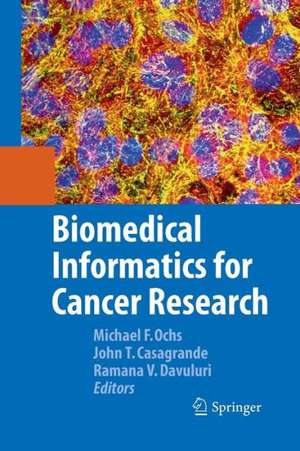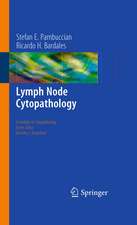Biomedical Informatics for Cancer Research
Editat de Michael F. Ochs, John T. Casagrande, Ramana V. Davulurien Limba Engleză Paperback – 26 noi 2014
| Toate formatele și edițiile | Preț | Express |
|---|---|---|
| Paperback (1) | 783.04 lei 6-8 săpt. | |
| Springer Us – 26 noi 2014 | 783.04 lei 6-8 săpt. | |
| Hardback (1) | 1103.95 lei 6-8 săpt. | |
| Springer Us – apr 2010 | 1103.95 lei 6-8 săpt. |
Preț: 783.04 lei
Preț vechi: 824.25 lei
-5% Nou
Puncte Express: 1175
Preț estimativ în valută:
149.84€ • 160.23$ • 124.93£
149.84€ • 160.23$ • 124.93£
Carte tipărită la comandă
Livrare economică 18 aprilie-02 mai
Preluare comenzi: 021 569.72.76
Specificații
ISBN-13: 9781489984517
ISBN-10: 1489984518
Pagini: 372
Ilustrații: XVIII, 354 p.
Dimensiuni: 155 x 235 x 20 mm
Greutate: 0.52 kg
Ediția:2010
Editura: Springer Us
Colecția Springer
Locul publicării:New York, NY, United States
ISBN-10: 1489984518
Pagini: 372
Ilustrații: XVIII, 354 p.
Dimensiuni: 155 x 235 x 20 mm
Greutate: 0.52 kg
Ediția:2010
Editura: Springer Us
Colecția Springer
Locul publicării:New York, NY, United States
Public țintă
ResearchCuprins
Concepts, Issues, and Approaches.- Biomedical Informatics for Cancer Research: Introduction.- Clinical Research Systems and Integration with Medical Systems.- Data Management, Databases, and Warehousing.- Middleware Architecture Approaches for Collaborative Cancer Research.- Federated Authentication.- Genomics Data Analysis Pipelines.- Mathematical Modeling in Cancer.- Reproducible Research Concepts and Tools for Cancer Bioinformatics.- The Cancer Biomedical Informatics Grid (caBIG‚): An Evolving Community for Cancer Research.- Tools and Applications.- The caBIG‚ Clinical Trials Suite.- The CAISIS Research Data System.- A Common Application Framework that is Extensible: CAF-É.- Shared Resource Management.- The caBIG® Life Sciences Distribution.- MeV: MultiExperiment Viewer.- Authentication and Authorization in Cancer Research Systems.- Caching and Visualizing Statistical Analyses.- Familial Cancer Risk Assessment Using BayesMendel.- Interpreting and Comparing Clustering Experiments Through Graph Visualization and Ontology Statistical Enrichment with the ClutrFree Package.- Enhanced Dynamic Documents for Reproducible Research.
Textul de pe ultima copertă
In the past two decades, the large investment in cancer research led to identification of the complementary roles of genetic mutation and epigenetic change as the fundamental drivers of cancer. With these discoveries, we now recognize the deep heterogeneity in cancer, in which phenotypically similar behaviors in tumors arise from different molecular aberrations. Although most tumors contain many mutations, only a few mutated genes drive carcinogenesis. For cancer treatment, we must identify and target only the deleterious subset of aberrant proteins from these mutated genes to maximize efficacy while minimizing harmful side effects.
Together, these observations dictate that next-generation treatments for cancer will become highly individualized, focusing on the specific set of aberrant driver proteins identified in a tumor. This drives a need for informatics in cancer research and treatment far beyond the need in other diseases. For each individual cancer, we must find the molecular aberrations, identify those that are deleterious in the specific tumor, design and computationally model treatments that target the set of aberrant proteins, track the effectiveness of these treatments, and monitor the overall health of the individual. This must be done efficiently in order to generate appropriate treatment plans in a cost effective manner. State-of-the-art techniques to address many of these needs are being developed in biomedical informatics and are the focus of this volume.
Together, these observations dictate that next-generation treatments for cancer will become highly individualized, focusing on the specific set of aberrant driver proteins identified in a tumor. This drives a need for informatics in cancer research and treatment far beyond the need in other diseases. For each individual cancer, we must find the molecular aberrations, identify those that are deleterious in the specific tumor, design and computationally model treatments that target the set of aberrant proteins, track the effectiveness of these treatments, and monitor the overall health of the individual. This must be done efficiently in order to generate appropriate treatment plans in a cost effective manner. State-of-the-art techniques to address many of these needs are being developed in biomedical informatics and are the focus of this volume.
Caracteristici
Includes supplementary material: sn.pub/extras







